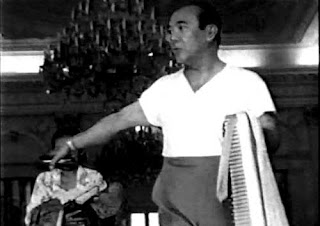If your funny t-shirts or kaos polos are turning out funny-looking, the problem may be your text. No matter how awesome your cool t shirt designs are when you imagine them, if your text is poorly designed, your shirts will always look unprofessional. But don't fear! With these 5 tricks of professional graphic designers, you can quickly turn those amateur custom t shirts into perfect and polished works of t shirt art.
T-Shirt Design Secret #1: Choosing the Right Font
When choosing a font for your t shirt text, make sure to pick one that supports your message. For example, if you're designing a funny t shirt, choose a font that has a funny feel to it. If you're designing a sexy t shirt, choose a font that has a sexy feel to it. And if you're designing a t shirt for a serious, professional law firm, you probably don't want to use that font with letters shaped like kittens.
While this may sound like common sense, many new t shirt designers and would-be t shirt entrepreneurs skip this step and just pick any standard font they might have lying around. Unfortunately, it's obvious in their results; what could have been a fun t shirt design ends up being boring and amateur-looking. If you're careful to choose a font that represents the content of your words, however, you can avoid this fate and your shirts will always be one step ahead of your competition.
T-Shirt Design Secret #2: Tracking and Kerning
Most of the time, when font text is typed into a computer program, the spaces between the letters and words are a little uneven, and often a little too wide. This extra and uneven space not only makes your text look a bit awkward and unprofessional, it also makes it slightly more difficult to read because the words don't visually hold together as units. Even if the viewer doesn't notice it, the eye and the brain have to work a bit harder and that extra bit of difficulty gives the viewer a subconscious feeling of unease.
Fortunately for the novice t shirt designer, this problem can be addressed by a combination of tracking and kerning, which are simply two methods of adjusting the spacing between letters.
Tracking has to do with adjusting the average spacing of letters across entire words, sentences, or selected ranges of letters. By adjusting the tracking, the t shirt artist can either decrease the average spacing between all the letters in the selected range (making the spacing "tighter"), or else increase the average spacing ("opening up" the text), depending on what's needed. Since the raw, unadjusted spacing varies from font to font, you'll have to decide which one is needed for your particular t shirt design. But a good trick used by professional t shirt designers is to start out by tightening the font too much (so the letters are too close together) and then slowly increasing the tracking until the words look right.
Kerning is very similar to tracking, but with one important difference: instead of adjusting the average spacing across an entire range of letters, kerning only adjusts the spacing between two letters at a time. This allows a greater degree of control than tracking, and allows a t shirt artist to fine tune the spacing between single letter pairs that still don't look quite right, even after the text has been tracked.
In general, the best practice is to use tracking to get the entire range of letters in a t shirt slogan to look pretty good, and then use kerning to fine tune the spacing between letter pairs until your t shirt text looks perfect.
T-Shirt Design Secret #3: Word Spacing
Once the letters of a t shirt slogan have been properly tracked and kerned, the next important step is to adjust the spacing between the words. Adjusting word spacing is very similar to tracking and kerning -- in fact, it's done exactly the same way as kerning and is really just kerning the spaces between words rather than letters -- but the rule of thumb for proper spacing between words is a little different, and so word spacing is a whole step unto itself.
In general, the best practice when adjusting spacing between words is to visualize the width of a lowercase "L" in the font that's being used, and then make the space between each word that wide. This means that the width of the spaces between words will be different from font to font (because the size of the lowercase "L" is different from font to font), but it also means that the spacing will be custom designed for the font in question. Creating the proper amount of space between words will support the effects of your tracking and kerning, thus helping your words to hold together better as separate visual units and improving readability.
T-Shirt Design Secret #4: Leading, aka "Line Spacing"
Another place that new t shirt designers often go wrong is in the leading, or "spacing between lines of text." Leading -- which is pronounced like the metal "lead" rather than like a "leader" taking people somewhere -- goes back to the days of the printing press, when a person would actually use small, thin pieces of lead to create vertical space between the lines of type. These days, of course, computers handle the leading for us. Unfortunately, when it comes to t shirt text, they often handle it poorly.
When a t shirt slogan is typed into a computer program, it often starts out with a little too much space between the lines. This helps make the text look very "fonty" rather than natural, as well as making the t shirt design (and the designer) seem very amateur. With just a small change to the leading, however, that same t shirt text can be made to look very tight and professional.
With leading, the goal is to create enough space between the lines of text so they fit nicely together and don't interfere with one another, without creating so much space that they look artificial or become difficult to read. The eye should be able to easily jump visually from one line to the next without losing its place, and without any effort at all. While there is no real rule of thumb for the proper amount of space between lines, a t shirt designer who begins adjusting the leading will quickly learn to "feel" when it's right. In general, the best way to start is to decrease the amount of leading -- tightening the space between the lines -- and then keep tweaking it up or down until it feels visually balanced. When it looks natural and reads smoothly, your t shirt slogan is one step closer to the big time.
T-Shirt Design Secret #5: Phrasing, aka "Line Breaking"
Phrasing has to do with where a t shirt designer chooses to break the lines of text, and is yet another aspect of good t shirt design that's often overlooked. Many new designers will just type in their text at the size they want, and pay no attention to which words the lines end on, and how those line breaks affect the t shirt's readability. More often than not, this results in a t shirt that reads terribly and feels amateurish.
For example, a poorly line-broken t shirt slogan might look something like this:
I'm not a
doctor but I play
one in real
life
As you can see, it's a little difficult to read this slogan because the semi-random breaking of logical phrases and groups of ideas causes both the eye and the brain to work harder to make sense of it all, and the result is the t shirt slogan ends up feeling choppy. With a little more thought and effort put into breaking the lines at natural points in the text, however, we end up with this:
I'm not a doctor
but I play one
in real life
Suddenly, the t shirt slogan flows naturally and is much easier to read. By keeping the logical phrases visually together, you can create a much more natural visual rhythm to your t shirt text, and the reader is easily able to process the t shirt's message without having to fight against poor phrasing to understand it.
T Shirt Design Secret #6: A Bonus Tip (Because I Like You)
Once you've applied these 5 secrets of the t shirt design professionals, you'll find that your t shirt text already looks much better and more professional than it did when you started. Unfortunately, you'll probably also find that you've been staring at your text for so long, it's become difficult to really properly judge its improvement. Such is the life of a t shirt artist! But don't panic! The professional graphic designers have a couple more tricks up their sleeves that'll help you overcome this professional hazard.
To check the spacing of your t shirt text and make sure that it's truly perfect, you can:
Look at your design upside down. If you see any spaces that look uneven or inconsistent, fix them.
Look at your design reflected in a mirror. If you see any spaces that look uneven or inconsistent, fix them.
Print out your design on a piece of paper, hold it up to a light source, and then look at your text from the back of the page. If you see any spaces that look uneven or inconsistent -- you guessed it -- fix them.
By doing any or all of these three strange things, you force your eyes and your brain to pay attention to the empty spaces between the letters rather than trying to read the words themselves. The words become abstract shapes to your brain, and you, the t shirt artist, are free to properly judge the empty spaces between the words.
And That's It!
As you can see, professional t shirt text design is really just a matter of creating text that not only supports your message, but also presents it in a way that is visually balanced and nicely spaced. By properly applying these t shirt design tips, your t shirt text will be much nicer to look at, easier to read, and miles ahead of all those amateur t shirt designs hitting the market. And, most importantly, your funny t shirt designs will finally be funny in a good way.
Now, if you're ready to start taking your t shirt design skills to the next level, you can find a free, simple, easy-to-follow video tutorial on tracking and kerning at Channel Shirt's t shirt design blog Did I mention it's free? Check it out!
About the Author: Much to his parents' continuing surprise, "Hollywood" John Harris has been a professional artist, designer, and freelance writer for 20 years. He is also co-founder of Channel Shirt, where he not only freely gives away all the secrets of t shirt design that "they" don't want you to know, he also shows those secrets in action on tons of his own funny t-shirts, as well as all the best shirts from around the web.










